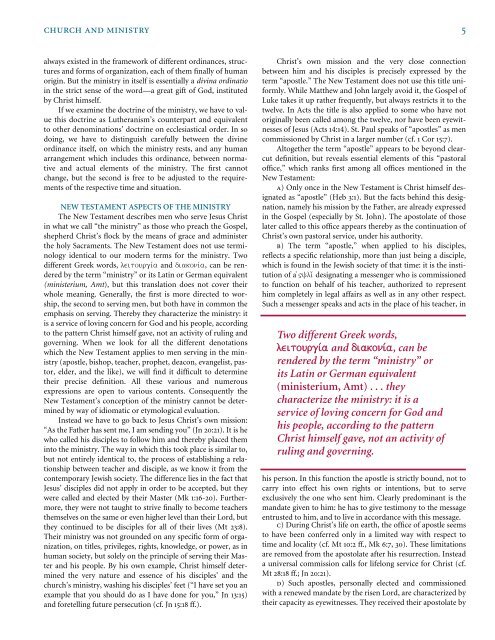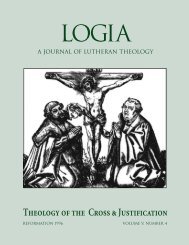You also want an ePaper? Increase the reach of your titles
YUMPU automatically turns print PDFs into web optimized ePapers that Google loves.
church and ministry 5<br />
always existed in the framework of different ordinances, structures<br />
and forms of organization, each of them finally of human<br />
origin. But the ministry in itself is essentially a divina ordinatio<br />
in the strict sense of the word—a great gift of God, instituted<br />
by Christ himself.<br />
If we examine the doctrine of the ministry, we have to value<br />
this doctrine as Lutheranism’s counterpart and equivalent<br />
to other denominations’ doctrine on ecclesiastical order. In so<br />
doing, we have to distinguish carefully between the divine<br />
ordinance itself, on which the ministry rests, and any human<br />
arrangement which includes this ordinance, between normative<br />
and actual elements of the ministry. <strong>The</strong> first cannot<br />
change, but the second is free to be adjusted to the requirements<br />
of the respective time and situation.<br />
NEW TESTAMENT ASPECTS OF THE MINISTRY<br />
<strong>The</strong> New Testament describes men who serve Jesus Christ<br />
in what we call “the ministry” as those who preach the Gospel,<br />
shepherd Christ’s flock by the means of grace and administer<br />
the holy Sacraments. <strong>The</strong> New Testament does not use terminology<br />
identical to our modern terms for the ministry. Two<br />
different Greek words, leitourgiva and diakoniva, can be rendered<br />
by the term “ministry” or its Latin or German equivalent<br />
(ministerium, Amt), but this translation does not cover their<br />
whole meaning. Generally, the first is more directed to worship,<br />
the second to serving men, but both have in common the<br />
emphasis on serving. <strong>The</strong>reby they characterize the ministry: it<br />
is a service of loving concern for God and his people, according<br />
to the pattern Christ himself gave, not an activity of ruling and<br />
governing. When we look for all the different denotations<br />
which the New Testament applies to men serving in the ministry<br />
(apostle, bishop, teacher, prophet, deacon, evangelist, pastor,<br />
elder, and the like), we will find it difficult to determine<br />
their precise definition. All these various and numerous<br />
expressions are open to various contents. Consequently the<br />
New Testament’s conception of the ministry cannot be determined<br />
by way of idiomatic or etymological evaluation.<br />
Instead we have to go back to Jesus Christ’s own mission:<br />
“As the Father has sent me, I am sending you” (Jn 20:21). It is he<br />
who called his disciples to follow him and thereby placed them<br />
into the ministry. <strong>The</strong> way in which this took place is similar to,<br />
but not entirely identical to, the process of establishing a relationship<br />
between teacher and disciple, as we know it from the<br />
contemporary Jewish society. <strong>The</strong> difference lies in the fact that<br />
Jesus’ disciples did not apply in order to be accepted, but they<br />
were called and elected by their Master (Mk 1:16-20). Furthermore,<br />
they were not taught to strive finally to become teachers<br />
themselves on the same or even higher level than their Lord, but<br />
they continued to be disciples for all of their lives (Mt 23:8).<br />
<strong>The</strong>ir ministry was not grounded on any specific form of organization,<br />
on titles, privileges, rights, knowledge, or power, as in<br />
human society, but solely on the principle of serving their Master<br />
and his people. By his own example, Christ himself determined<br />
the very nature and essence of his disciples’ and the<br />
church’s ministry, washing his disciples’ feet (“I have set you an<br />
example that you should do as I have done for you,” Jn 13:15)<br />
and foretelling future persecution (cf. Jn 15:18 V.).<br />
Christ’s own mission and the very close connection<br />
between him and his disciples is precisely expressed by the<br />
term “apostle.” <strong>The</strong> New Testament does not use this title uniformly.<br />
While Matthew and John largely avoid it, the Gospel of<br />
Luke takes it up rather frequently, but always restricts it to the<br />
twelve. In Acts the title is also applied to some who have not<br />
originally been called among the twelve, nor have been eyewitnesses<br />
of Jesus (Acts 14:14). St. Paul speaks of “apostles” as men<br />
commissioned by Christ in a larger number (cf. 1 Cor 15:7).<br />
Altogether the term “apostle” appears to be beyond clearcut<br />
definition, but reveals essential elements of this “pastoral<br />
office,” which ranks first among all offices mentioned in the<br />
New Testament:<br />
a) Only once in the New Testament is Christ himself designated<br />
as “apostle” (Heb 3:1). But the facts behind this designation,<br />
namely his mission by the Father, are already expressed<br />
in the Gospel (especially by St. John). <strong>The</strong> apostolate of those<br />
later called to this office appears thereby as the continuation of<br />
Christ’s own pastoral service, under his authority.<br />
b) <strong>The</strong> term “apostle,” when applied to his disciples,<br />
reflects a specific relationship, more than just being a disciple,<br />
which is found in the Jewish society of that time: it is the institution<br />
of a j"yliv;<br />
designating a messenger who is commissioned<br />
to function on behalf of his teacher, authorized to represent<br />
him completely in legal affairs as well as in any other respect.<br />
Such a messenger speaks and acts in the place of his teacher, in<br />
Two different Greek words,<br />
leitourgivva<br />
and diakonivva,<br />
can be<br />
rendered by the term “ministry” or<br />
its Latin or German equivalent<br />
(ministerium, Amt) . . . they<br />
characterize the ministry: it is a<br />
service of loving concern for God and<br />
his people, according to the pattern<br />
Christ himself gave, not an activity of<br />
ruling and governing.<br />
his person. In this function the apostle is strictly bound, not to<br />
carry into effect his own rights or intentions, but to serve<br />
exclusively the one who sent him. Clearly predominant is the<br />
mandate given to him: he has to give testimony to the message<br />
entrusted to him, and to live in accordance with this message.<br />
c) During Christ’s life on earth, the office of apostle seems<br />
to have been conferred only in a limited way with respect to<br />
time and locality (cf. Mt 10:2 V., Mk 6:7, 30). <strong>The</strong>se limitations<br />
are removed from the apostolate after his resurrection. Instead<br />
a universal commission calls for lifelong service for Christ (cf.<br />
Mt 28:18 V.; Jn 20:21).<br />
d) Such apostles, personally elected and commissioned<br />
with a renewed mandate by the risen Lord, are characterized by<br />
their capacity as eyewitnesses. <strong>The</strong>y received their apostolate by

















